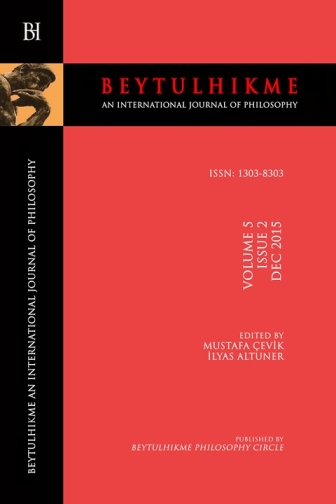Author :
Abstract
Scheleiermacher ve Dilthey’ın hermeneutik yaklaşımlarının epistemolojik ve yöntemsel içerimini ontolojik bir temelde dönüşüme uğratan Heidegger, Varlık ve Zaman’da gerçekleştirdiği “hermeneutik döngü” aracılığıyla hermeneutiğe yeni bir düşünce deneyimi kazandırmıştır. Anlamanın epistemolojik değil ontolojik bir zemine sahip olduğunu söyleyen Heideggerci iddia, hermeneutiğin evrenselliği tezini felsefeye taşıyan Gadamer’de yankısını bulmuştur. Heidegger ve Gadamer’in hermeneutik gelenek açısından önemi epistemolojik bir içerime sahip olan Husserl’in fenomenolojik metodolojisini ontolojik bağlamda temellendirmiş olmalarıdır. Hem Heidegger’de hem de Gademer'de ontoloji dünyada Dasein tarzında varolan insansal varlığın anlayan varlığına karşılık gelir. Bu bağlamda her iki düşünürün hermeneutik yaklaşımının temel iskeletini fenomenler ve söz olarak logos arasındaki kökensel bağ yani; anlama, yorumlama ve dil arasındaki özsel ilişki oluşturur.<
Keywords
Abstract
Heidegger transformed Schleiermacher and Dielthey’s hermeneutic approaches epistemological and procedural implications on an ontological basis and in Time and Being by using “hermeneutic cycle” he have brought a thinking experience in to hermeneutics. Heideggerian pretense claims that understanding has an ontological not epistemological basis. This claim had a broad repercussion in Gadamer who have brought his thesis about universality of hermeneutics in philosophy. Heidegger and Gadamer’s importance in hermeneutic tradition is that they have based Husserl’s phenomenological methodology (which has an epistemological implication) in an ontological context. Both in Heidegger’s and Gadamer’s philosophy, ontology correspond to understanding existence of humanly existence in Dasein style. In this context; the basic structure of both philosophers hermeneutic approach consists of the original link between phenomena and logos as verbalism which is; the essential relation between language, understanding and rendition.<
Keywords
- Bernstein, R. J. (2009). Objektivizmin ve Rölativizmin Ötesi (çev. F. Yılmaz). İstan- bul: Paradigma Yayınları.
- Bubner, R. (1993). Modern Alman Felsefesi (çev. A. Yardımlı). İstanbul: İdea Yayı- nevi.
- Caputo, J. D. (2002). Varlık Düşüncesi ve İnsanlığın Diyalogu: Heidegger ve Rorty. İnsan Bilimlerine Prolegomena: Dil, Gelenek ve Yorum (der. & çev. H. Arslan). İstanbul: Paradigma Yayınları.
- Carman, T. (2006). The Principle of Phenomenology. The Cambridge Companion to Heidegger (ed. C. B. Guignon). Cambridge: Cambridge University Press.
- Dostal, R. J. (2006). Time and Phenomenology in Husserl and Heidegger. The Cambridge Companion to Heidegger (ed. C. B. Guignon). Cambridge: Cambridge University Press.
- Frede, D. (2006). The Question of Being: Heidegger‟s Project. The Cambridge Companion to Heidegger (ed. C. B. Guignon). Cambridge: Cambridge Univer- sity Press.
- Gadamer, H.-G. (1976). Philosophical Hermeneutics (ed. & trans. D. E. Linge). Ber- keley: University of California Pres.
- Gadamer, H.-G. (2002a). Hermeneutik Problemin Evrenselliği. Hermeneutik ve Hümaniter Disiplinler (der. & çev. H. Arslan). İstanbul: Paradigma Yayınları.
- Gadamer, H.-G. (2002b). Kuşkucu Hermeneutik. Hermeneutik ve Hümaniter Disip- linler (der. & çev. H. Arslan). İstanbul: Paradigma Yayınları.
- Gadamer, H.-G. (2002c). Eleştirmenlerime Cevap. Hermeneutik ve Hümaniter Disiplinler (der. & çev. H. Arslan). İstanbul: Paradigma Yayınları.
- Gadamer, H.-G. (2002d). Metin ve Yorum. Hermeneutik ve Hümaniter Disiplinler (der. & çev. H. Arslan). İstanbul: Paradigma Yayınları.
- Gadamer, H.-G. (2002e). İnsan ve Dil. İnsan Bilimlerine Prolegomena: Dil, Gelenek ve Yorum (der. & çev. H. Arslan). İstanbul: Paradigma Yayınları.
- Gadamer, H.-G. (2002f). Hermeneutik Refleksiyonun Kapsamı ve Fonksiyonu. Retorik, Hermeneutik ve Sosyal Bilimler: İnsan Bilimlerinde Retoriğe Dönüş (der. & çev. H. Arslan). İstanbul: Paradigma Yayınları.
- Gadamer, H.-G. (2002g). Hermeneutik ve Logosentrizm. Hermeneutik ve Hümani- ter Disiplinler (der. & çev. H. Arslan). İstanbul: Paradigma Yayınları.
- Gadamer, H.-G. (2003). Hermeneutik. Hermeneutik Üzerine Yazılar (der. & çev. D. Özlem: Ankara: İnkılap Kitabevi.
- Gadamer, H.-G. (2008). Hakikat ve Yöntem I (çev. H. Arslan & İ. Yavuzcan). İs- tanbul: Paradigma Yayınları.
- Gorner, P. (2007). Heidegger’s Being and Time: An Introduction. New York: Camb- ridge University Press.
- Grondin, J. (2003). The Philosophy of Gadamer (trans. K. Plant). Chesham: Acumen Publishing.
- Heidegger, M. (2001). Sein und Zeit. Tübingen: Max Niemeyer Verlag.
- Heidegger, M. (2002b). Hümanizm Üzerine Mektup. Hümanizmin Özü (der. & çev. A. Aydoğan). İstanbul: İz Yayıncılık.
- Heidegger, M. (2008). Varlık ve Zaman (çev. H. Ökten). İstanbul: Agora Kitaplığı.
- Hekman, S. (1999). Bilgi Sosyolojisi ve Hermeneutik (çev. H. Arslan & B. Balkız).
- Hoy, D. C. (2006). Heidegger and the Hermeneutic Turn. The Cambridge Compa- nion to Heidegger (ed. C. B. Guignon). Cambridge: Cambridge University Press.
- Ormitson, G. L. & Schrift, A. D. (2002). Hermeneutiğe Giriş. Hermeneutik ve
- Palmer, R. E. (1969). Hermeneutics: Interpretation Theory in Schleiermacher, Dilthey, Heidegger, and Gadamer. Evanston: Northwestern University Press.
- Wachterhauser, B. R. (2002). Anlamada Tarih ve Dil. İnsan Bilimlerine Prolegome- na: Dil, Gelenek ve Yorum (der. & çev. H. Arslan). İstanbul: Paradigma Yayınları.
